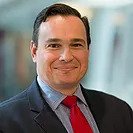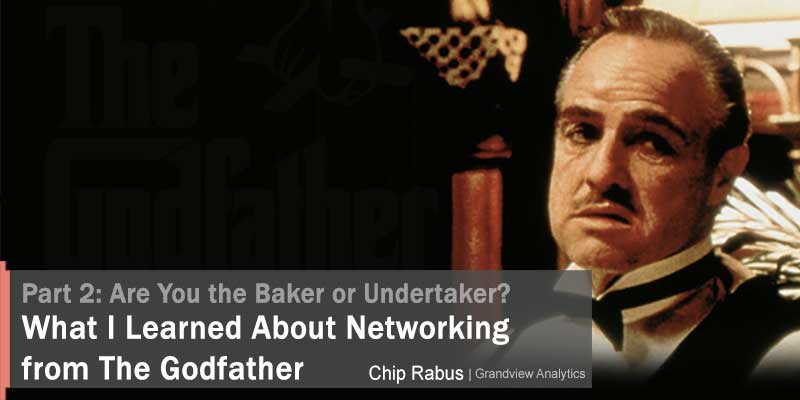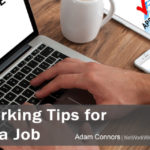This is a guest post by Chip Rabus, Head of Sales at Grandview Analytics
In Part 1 of this article, I wrote how Don Vito Corleone in the movie The Godfather taught us the importance of building the right kind of relationships and value with our connections. How we develop and nurture our associations with others can have a positive – or negative – impact on our professional and personal lives. I presented the difference in Don Corleone’s relations with gentlemen he refers to as “The Baker” and “The Undertaker” which demonstrated how we should continuously respect and foster our relationships, and not just reach out to our network when we need something.
What does this really mean? Well, let me tell you a story.
In July, I was dismissed from a sales position after 13 months. This role should’ve paid more in base salary than it did, or a whole lot less, depending on how you look at it. I was terminated for performance, sales speak for not selling enough, which I wasn’t. From my perspective, the company changed the rules of the game too many times and should’ve been much more flexible with both metrics and compensation. I was under performing based on the given rules, and therefore not greatly surprised when the axe fell.
That’s not to say it didn’t hit me like, well, the proverbial axe.
I had already been looking at other opportunities given the dynamic with the metrics, yet still there was the expected blood-running-cold when I was informed: “Today will be your last day.”
Losing one’s job is regularly listed among the most stressful of human events, only slightly out-ranked by blood pressure driving challenges such as divorce and death of a spouse or child.
You never think it’s going to happen to you … but it probably will. Unless you’ve chosen a career in civil service where lifetime employment is still a possibility – but rare those positions are.
Any of us who take a risk to further advance our standard of living – like changing jobs or starting a business – expects that we may, no matter how calculated our decision, make the wrong one from time to time.
I have (I believe) a healthy sense of right and wrong with respect to most things, including employment. In my world view, I’m expected to work hard and give a measure of value to my employer to justify my compensation. In sales, commission dollars designate the value of the effort put in above a certain minimum, if the playing field is level. While I’ll argue the field was far from level in my last position, that’s not what this blog is about; it’s more “about” what happens in the aftermath of losing one’s job, and the importance of fostering relationships within your network.
How I Utilized My Network to Find a New Job
I had started work early that day and had actually planned to leave a little early for a lesson and a round of golf. However, when the axe fell (and after the initial shock and obligatory call with HR), I immediately set to work.
My role was no longer selling data to financial services firms – my job was now selling myself to the highest bidder at the most promising organization I could find.
After retooling my resume, I made calls and sent emails. Not to companies and hiring managers and certainly not to recruiters, but to friends and colleagues; people I had done business with or pointed to jobs or career changes; to connections I’ve offered advice; former clients; close competitors – basically any one I had contact with over the last two years whom I might have positively impacted, regardless if they may have a job for me or even if I wanted to work within their organization.
My purpose was to cast a wide net among my contacts, colleagues, and friends. I didn’t ask for favors or remind them of past generosities (although if they remembered a kindness … all the better for me!), I was simply connecting and letting them know my current situation; what I was asking was implicit and their assistance was mutually assured.
For years I had responded to requests for assistance or direction in job searches, and provided additional information about what data sets I sold, beyond my stated position. On occasion I suggested solutions for clients that were more cost effective for them and not as beneficial, in the immediacy, for me or my company – but which benefited everyone in the long run.
My entire career I had done right by colleagues, clients, prospects, and anyone with whom I had professional contact since it was always the right thing to do, but also because when I needed something, I wanted to be the baker, not the undertaker.
One of the first emails I sent resulted in a lunch invitation, and I accepted. I was thinking I would ask a couple of old business contacts, who now ran their own company, if they were aware of opportunities in sales or business development which fit my passions and skill sets. It was also a chance for me to soft-pitch my own idea which might complement their present service offerings.
When we met, the undercurrent was almost immediately evident. They wanted to build their business – but did not have the breadth of contacts needed to do so. Moreover, they didn’t have the time or skills to leverage the connections they did have.
What they did not have, I did – time, relationships, prospecting skills, and determination.
We each came to the meeting with varied and complimentary agendas, but also with plans that were altruistic. I wanted to ask them to put the word out for me while bringing an idea which might help them evolve their firm – one I was willing to surrender to their business should they be willing to incorporate into their offering. They came prepared to offer ideas on those I should reach out to and some ammunition on who was hiring plus their names for influence.
Two weeks later, we were actively discussing how I fit into their organization and how that role could develop.
Today, I am Head of Sales for Grandview Analytics, a role which evolves almost daily in continued consultation with those two managing partners who came to our meeting as bakers.
In business, as in life, be the baker.
Photo/image courtesy of Flickr

Charles A. “Chip” Rabus is currently Head of Sales at Grandview Analytics, a professional services firm specializing in technology resources for the financial sector, where he drives the company’s sales and marketing efforts.
Chip has more than 20 years of client service and sales leadership experience. He’s held several sales and leadership positions at Bloomberg LP, the world’s leading provider of financial news, data, and analytics; through these roles he developed a rich knowledge of financial data, desktop analytics terminals, and Order Management Systems. Most recently, Chip led sales efforts at alternative data provider Edison Software, and also has experience in bond brokerage and trading.
Originally from New York, Chip now makes his home in Chicago. He holds an MBA in Investment Management from Pace University and a BA in American History from Stony Brook University.
Outside of work, Chip is passionate about cooking for his family, enjoys reading and discussing U.S. history, and holds open the possibility he might one day be good at golf.









